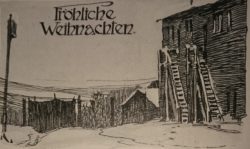Christmas 1918 in Skipton Camp
For some of the Skipton prisoners Christmas 1918 was their fifth in captivity. One of the NCOs, Adolf Schonek, describes the celebrations in the camp:
Christmas had come around again, the fifth time in captivity for many of us. But this time it had a special meaning: the old Christmas message ‘Peace on Earth’ had at least partly come true; the Armistice had put an end to the war. What the peace would be like nobody could yet imagine. On the contrary! Since the terms of the Armistice were so harsh, peace would surely be all the more bearable. There was hardly anything left that the opposing side had not demanded and been granted. So hope for the peace dawned in our hearts like the promise of spring. The possibility that we might soon go home shone as brightly before our trusting eyes as any shimmering mirage ever appeared to a man wandering in the desert. So this last Christmastime of our captivity was the first we planned to celebrate with unadulterated joy– and we did celebrate! It was the best Christmas that I experienced in England.
A few days before, a small tree was brought to each of the barracks. Of course, we only had modest means available to decorate them: paper and cotton wool, but nevertheless in the skilled hands of some especially talented men these were crafted into little works of art, and when the green denizens of the forest appeared in all their glory, we could with a stretch of the imagination almost recognise our dear old German Christmas tree whose magic spell, which first enchanted us in childhood, had not, even yet, quite faded away.
Then came Christmas Day, bringing us a number of pleasant surprises. The kitchen administration and the camp Sergeant Major seemed determined to bowl us over – and they certainly succeeded. Only someone who has actually been a prisoner in England can really appreciate what a blessing a mouthful of good coffee is after all that tea. And this blessing was conferred on us – and with milk too! There was even cake to go with it, proper cake with proper raisins, properly baked, with proper sugar on top! However much we doubted it, we had to accept the incredible fact that such things actually did still exist. For some however, especially those with families, every bite evoked the sad realistation that their loved ones at home would certainly not have such a festive breakfast. I am convinced that many of us would rather have packed up the whole glorious thing and sent it home.
Eight comrades who were proficient singers had set up an octet and entertained us with the traditional hymn ‘A great and mighty wonder’ and Beethoven’s ‘Hymn to the Night’. And then came Father Christmas, in costume , with a big sack and a big beard! The beard was false but the sack was real and contained the presents that the officers in the camp had provided for the men. There was something for everybody: some were given pocket knives, tobacco pipes, cigar and cigarette holders, others board games, soap, shaving soap, braces and many other things that brought great joy. But Father Christmas also knew quite well that ‘It is the spirit that quickeneth’ and had inserted a little verse to each package, good-humouredly but aptly mocking the greater and lesser weaknesses of the recipient in language that admittedly was not always suitable for ‘polite society’ and did not always conform to the norms of poetry, but was always comical. Gales of laughter accompanied the ‘proclamation’ of these pearls of German poetry and Father Christmas was quite right to stroke his beard in contentment.
So the evening passed in the most cheerful of atmospheres. The bell for lights out rang all too soon. ‘Let’s hope it was for the last time!’ With this hope we went our separate ways to seek our usual solace in dreamland for the harsh realities of days past and to come.

Christmas card sent from the camp designed by Erich Dunkelgod
From Kriegsgefangen in Skipton p.294-297 (translated by Alison Abbey & Ada Whitaker)
